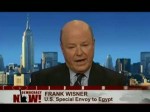The Empire’s Bagman
Click here to view this media A portion of Amy Goodman’s interview with Prof. Vijay Prashad , giving background on Obama’s Special Envoy to Egypt Frank Wisner who over the weekend said Mubarak should stay . A decidedly off-script moment for the administration, who quickly distanced themselves from his remarks. VIJAY PRASHAD: Frank Wisner, Jr., had a more steady career in the State Department, was the ambassador in Egypt between 1986 and 1991. During that period, he became very close friends with Hosni Mubarak and, at the time, convinced President Mubarak to bring Egypt on the side diplomatically of the United States during the first Gulf War. Subsequently, Frank Wisner was ambassador in the Philippines and then in India, before returning to the United States, where he became essentially one of the great eminences of the Democratic Party. One of the things he did during this recent period is author a report for the James Baker Institute, where he argued that the most important thing for American foreign policy is not democracy, which they treat as a long-term interest, but stability, which is the short-term interest . So, Frank Wisner, Jr., is seasoned State Department official, a very close friend of Mubarak, a man more committed to stability than democracy, and, yes, an employee at Patton Boggs, where one of the portfolios is for Patton Boggs to lobby on behalf of the government of Egypt. Your piece was called, Professor Prashad, “The Empire’s Bagman.” Talk about who Frank Wisner is, who it is President Obama sent to Egypt, and why the U.S. ambassador to Egypt wasn’t the one who was talking with the government. VIJAY PRASHAD: Yes, the point is a very good one, why Margaret Scobey herself was not in charge of the deliberations. Instead, President Obama turned to Frank Wisner, Jr. Frank Wisner, Jr., has had a 36-year career in the State Department. He is the son of Frank Wisner, Sr., a man very well known at the CIA, who was the operational chief to conduct at least three coups d’état—Arbenz in Guatemala, Mossadeq in Iran, and the attempted coup in Guyana. He was also, Frank Wisner, Sr., the man who created Wisner’s Wurlitzer, where the United States government paid journalists to go and do propaganda in Europe and in the rest of the world. Frank Wisner, Jr., had a more steady career in the State Department, was the ambassador in Egypt between 1986 and 1991. During that period, he became very close friends with Hosni Mubarak and, at the time, convinced President Mubarak to bring Egypt on the side diplomatically of the United States during the first Gulf War. Subsequently, Frank Wisner was ambassador in the Philippines and then in India, before returning to the United States, where he became essentially one of the great eminences of the Democratic Party. One of the things he did during this recent period is author a report for the James Baker Institute, where he argued that the most important thing for American foreign policy is not democracy, which they treat as a long-term interest, but stability, which is the short-term interest. So, Frank Wisner, Jr., is seasoned State Department official, a very close friend of Mubarak, a man more committed to stability than democracy, and, yes, an employee at Patton Boggs, where one of the portfolios is for Patton Boggs to lobby on behalf of the government of Egypt. AMY GOODMAN: We’re talking to Vijay Prashad, a professor at Trinity College. Now, what he said, Vijay Prashad, that he said Mubarak should remain in power, the man who works for the lobbying firm, well known, Patton Boggs, that is working for—that boasts about working for the Egyptian government, now saying that another client of his firm should remain in power. VIJAY PRASHAD: Yes. It’s interesting that in that same speech he mentioned that Mubarak should be able to, in a sense, author his own legacy. I mean, he is probably speaking partly on the basis of this broad policy that he has, which is that stability is more important than democracy, and secondly, partly from friendship. It should be said that the United States government has essentially been chasing events in this period. There are two pillars of U.S. foreign policy that they’ve been trying to maintain at the same time as not lose their credibility in the world. And the two basic pillars, the first one is to maintain Egypt as a close ally in the war on terror. That includes, of course, things like extraordinary rendition, but also includes Egypt carrying America’s buckets in places like the Arab League. The second important pillar is to ensure that whoever comes to power in Egypt, whether Mubarak or a Mubarak successor, will uphold the Egypt-Israel peace treaty of 1979. These are the two principal pillars of U.S. foreign policy vis-à-vis Egypt. What the Obama administration, it seems to me, has been trying to do is to ensure that if Mubarak himself cannot carry these two pillars, then some successor, a Mubarak-lite, Mubarak number two, will come in and carry the pillars forward. The United States does not have the best record in, you know, helping its dictatorial friends in the long term. We’ve seen that with Manuel Noriega. We’ve seen that with Saddam Hussein. So, the friendship that Frank Wisner, Jr., has for Mubarak might be a little liability, but broadly put, his attitude towards Mubarak and the Mubarak regime is quite consistent with the broad outlines of the Obama policy and of the State Department.

Go here to read the rest:
